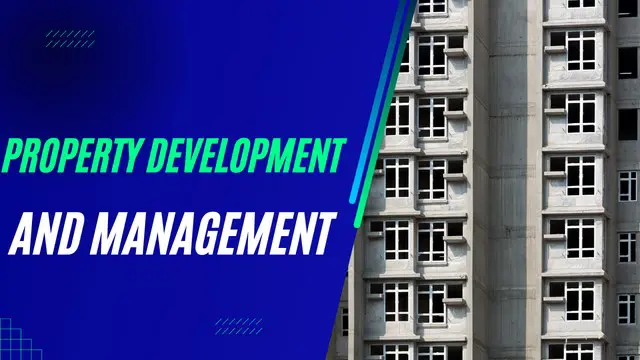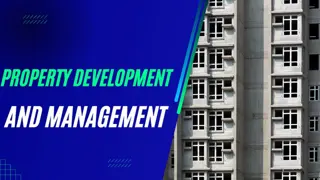
Property Management (Property Management) - CPD Certified
CPD Certified| Free PDF Certificate | Lifetime Access | Learner Support | No Hidden Fees | 100% Success Rate
EDURISE
Summary
- Certificate of completion - Free
- Reed courses certificate of completion - Free
- Tutor is available to students
Add to basket or enquire
Overview
Enrol Property Management online training to kickstart your exciting career or passion and ensure your profound insight and knowledge.
In order to ease your journey toward your goal, we designed this customised Property Management course after completing extensive research. The Property course covers all of the latest information to keep you a step ahead of the job market and prepare you for the next step.
This Property Management training course will provide you with the essential training and relevant experience, and this Property Management course is suitable for both beginners and those who are already functioning in this Property profession and looking to dominate their career.
Key Goals
- Gain solid understanding.
- Improve your Property Management career.
- Industry expert guidance is included with this extensive Property Management online training.
- Learn from industry expert professionals about highly essential Property Management subjects.
- Lifetime access with this Property Management training.
- Excellent online-learning materials.
- Learn this Property Management on a user-friendly, cutting-edge online learning platform.
Free Gift
- Course Completion PDF Certificate
- Tutor Support
Curriculum
Course media
Description
The property management industry is experiencing a surge in demand, driven by the ever-expanding real estate market and the need for skilled professionals to manage and maintain properties. This growth trend is backed by data and offers substantial opportunities for those looking to enter or advance in this field.
Job Demand:
- Recent data reveals that the demand for Property Managers is on the rise. The Bureau of Labor Statistics projects a steady increase in property management jobs over the next decade. This growth is fueled by the increasing number of rental properties and the need for effective management.
Business Impact:
- Property management plays a crucial role in real estate, where efficient management directly impacts the value of properties and the satisfaction of tenants. Businesses and investors are increasingly recognizing the importance of property management professionals.
Career Prospects:
- A career in property management offers a wide array of roles, from Residential Property Manager to Commercial Property Manager. Data shows that the median income for property managers is competitive, making it an attractive career choice.
Why You Should Consider This Role:
Economic Stability: Property management is a recession-resistant field. The demand for housing remains constant, ensuring a stable and reliable career.
Diverse Career Opportunities: Property management spans residential, commercial, and industrial properties. There's a niche for every interest within this industry.
Financial Growth Potential: As the value of properties appreciates, so does the potential for financial growth, both for property managers and property owners.
Customer Relations: For those who enjoy working with people, property management offers the opportunity to build strong tenant relationships and enhance tenant satisfaction.
Problem-Solving: Property managers frequently encounter challenges, requiring them to think on their feet and find creative solutions, making it a dynamic and intellectually engaging field.
Community Impact: Effective property management contributes to the well-being of communities by maintaining safe and comfortable living and working environments.
Elevate your career prospects in property management by enrolling in our comprehensive Property Management Training. Equip yourself with the knowledge and skills needed to thrive in this data-driven, dynamic field. Secure your place in a career that's on the rise, making an impact on property values, tenant experiences, and business success.
Certificate of Completion
After completing the Property Management diploma course, you will be able to obtain your free PDF certificate of course completion.
Who is this course for?
Learning Outcomes:
Foundational Understanding of Property Management:
- Develop a solid foundational understanding of property management, covering essential concepts and terminologies, enabling you to navigate the field effectively.
Proficiency in Property Rental Management:
- Gain the skills and knowledge required to manage property rentals efficiently, from initial preparation to tenant selection and ongoing maintenance.
Comprehensive Property Management Techniques:
- Learn a range of techniques and tools for effective property management, including maintenance, tenant communication, and problem-solving, ensuring properties are well-maintained and tenants are satisfied.
Strategic Property Procurement and Progression:
- Develop strategic insight into property procurement, progression, and expansion, enabling you to make informed decisions for property investments and growth.
Effective Presentation and Communication Skills:
- Acquire presentation and communication skills to interact with tenants, property owners, and stakeholders professionally, facilitating productive relationships and successful property management.
Module Descriptions:
Preparation:
- The "Preparation" module introduces students to the fundamental concepts of property management. It covers key terminology, legal considerations, and the initial steps involved in property management preparation.
Progression:
- "Progression" explores the strategic aspect of property management, focusing on how to expand property portfolios, make informed investment decisions, and navigate the dynamic real estate market effectively.
Procurement:
- In the "Procurement" module, students learn about the acquisition and procurement of rental properties. This includes property selection, purchase considerations, and tenant selection criteria.
Perspiration:
- "Perspiration" delves into the day-to-day efforts required for successful property management. It covers techniques, tools, and best practices for property maintenance, tenant relations, and problem-solving.
Presentation:
- The "Presentation" module emphasizes the importance of effective communication and presentation skills in property management. Participants learn how to interact professionally with tenants, property owners, and other stakeholders.
Introduction to Property:
- This introductory module provides a foundational understanding of property management, covering the basics of property ownership, types of properties, and the role of a property manager.
Renting Property:
- "Renting Property" focuses on the process of renting properties, from preparing properties for rent to selecting and communicating with tenants.
The Brass Tacks of Managing Rentals:
- In this module, students learn the essential elements of managing rental properties, including legal considerations, financial aspects, and maintenance requirements.
Techniques and Tools for Managing the Property:
- This module explores various techniques and tools that property managers can use to efficiently manage properties. Topics include maintenance strategies, tenant screening, and communication tools.
The Part of Tens:
- The final module provides a summary and highlights key takeaways from the course. It offers insights and tips in "top ten" format, serving as a quick reference guide for property management best practices.
Requirements
The Property Management course has no formal entry requirements.
Career path
- Property Management Assistant: Entry-level position with a typical UK salary ranging from £20,000 to £30,000 per year.
- Property Manager or Asset Manager: With experience and qualifications, salary can advance to between £31,000 and £60,000 annually.
- Senior Property Manager or Property Portfolio Director: Experienced professionals in these roles may earn £61,000 to £100,000 or more.
Questions and answers
Currently there are no Q&As for this course. Be the first to ask a question.
Certificates
Certificate of completion
Digital certificate - Included
Reed courses certificate of completion
Digital certificate - Included
Will be downloadable when all lectures have been completed
Reviews
Currently there are no reviews for this course. Be the first to leave a review.
Legal information
This course is advertised on reed.co.uk by the Course Provider, whose terms and conditions apply. Purchases are made directly from the Course Provider, and as such, content and materials are supplied by the Course Provider directly. Reed is acting as agent and not reseller in relation to this course. Reed's only responsibility is to facilitate your payment for the course. It is your responsibility to review and agree to the Course Provider's terms and conditions and satisfy yourself as to the suitability of the course you intend to purchase. Reed will not have any responsibility for the content of the course and/or associated materials.


